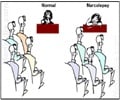A new study analyzed how abnormal acylcarnitines in 57 NT1 (fatty acid) metabolism influences sleep disorders namely narcolepsy type 1 and other hypersomnia.

Sleep Disorders
Then, it was examined whether rs5770917 in CPT1B gene affects CPT1 activity, because rs5770917 is significantly correlated with lower expression levels of CPT1B gene. No significant correlation between rs5770917 and CPT1 activity was detected in general. However, there was an interaction between BMI (non-obese <25kg/m2 and obese ≥25kg/m2) and rs5770917 (risk+, risk-), and non-obese NT1 patients without the risk allele had higher CPT1 activity.RNA sequencing-based whole transcriptome analysis¡Ðlow expression levels of carnitine shuttle related genes.
Transcriptome analysis was carried out in the whole blood samples from 42 NT1 patients and 42 healthy controls. SLC25A20 gene encoding carnitine-acylcarnitine translocase (CACT) and carnitine palmitoyltransferase 2 (CPT2) gene involved in the carnitine shuttle had the second and fifth lowest P values, respectively, and the expression levels were lower in the patients. CPT1B gene was not included in differentially expressed genes in NT1.
However, the risk allele of rs5770917 in CPT1B gene suppresses CPT1B expression. No genetic variants significantly correlated with expression levels of SLC25A20 and CPT2 were detected. These results indicated that CPT1B expression levels are downregulated by the genetic factor associated with NT1, while SLC25A20 and CPT2 expression levels in NT1 patients are downregulated by non-genetic factors.
This is the first report of reliable changes in the long-chain acylcarnitines levels and CPT1 activity in NT1 and other hypersomnia. The result of the transcriptome analysis also supports a decreased metabolism of long-chain fatty acids in NT1. Taken together, abnormal fatty acid metabolism underlies the pathophysiology of the sleep disorders. Furthermore, CPT1 activity could be a potential biomarker for screening certain sleep disorders such as NT1 and other hypersomnia.
Source-Eurekalert















